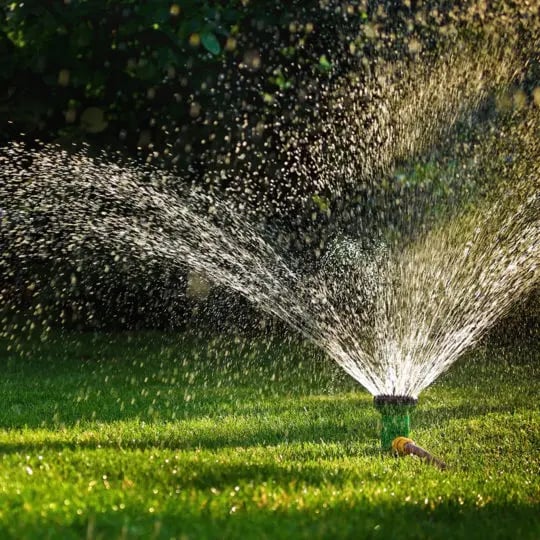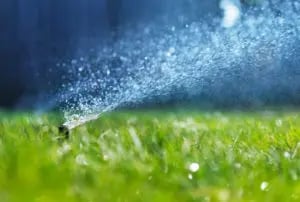Effective Tips For Watering Your Lawn

Every plant on earth needs a certain amount of water to keep it healthy and thriving. Turf grass requires more water than trees, shrubs, and other plants because its roots are shallower than these larger plants. The larger the plant, the deeper its roots can go for water during hot months. Typically grass roots remain in the top 6” of soil where evaporation occurs making it important to get the proper amounts of water into your soil at the correct times.
Here are lawn watering tips that will ensure you’re turf is looking its best during each season:
Table of Contents
- How To Determine If Your Lawn Needs Water
- How Long Should You Water Your Lawn
- When is the Best Time of Day To Water Your Lawn?
- How Often Should You Water Your Lawn?
- The Best Way To Water Your Lawn
How To Determine If Your Lawn Needs Water
Before turning on that faucet, it’s important to be able to figure out if your lawn needs water in the first place.
Does your lawn need water?

Here’s a simple method to help you out.
Step on your lawn and observe: if the grass springs back up immediately, you can rest assured that there is no need to water it. However, if the grass remains flattened for a few seconds, that’s a telltale sign that it’s time to give your turf a refreshing dose of water.
Keeping a close eye on your lawn’s hydration needs will ensure it stays healthy and vibrant.
Some services such as fertilizing, as well as aeration and seeding also require different watering requirements. Your service provider should supply you with a guide on just how much water your lawn needs during the weeks following service.
How Long Should You Water Your Lawn
Now that you’ve determined that your lawn could use a drink, it’s imperative to learn just how much it needs.
 How Much Water Does Your Lawn Need?
How Much Water Does Your Lawn Need?
There are many factors that come into play when it comes to watering your lawn because no two lawns are identical. A healthy maintained lawn needs 2” of water per week to keep it dense during summer months, but much less when the weather is cool and cloudy.
The total amount of water you apply to your lawn will be the difference between required and what mother nature supplies, so make sure to keep an eye on the forecast!
When it comes to watering your turf, it is important to consider additional factors that can affect the watering process:
- One such factor is the water source pressure, which can impact the efficiency and coverage of the watering.
- Additionally, the type of terrain, whether it is flat or sloped, plays a role in determining how water is distributed across the surface of the turf.
- Lastly, the amount of shade present in the area should also be taken into account as it can influence the evaporation rate and moisture retention of the turf.
By considering these factors, you can ensure optimal watering for your turf, promoting its health and vitality.
When is the Best Time of Day To Water Your Lawn?
The best time of day to water your lawn is between 5 am and no later than 10 am.
If you water after noon (the hottest part of every day) the water will mostly evaporate before being able to disperse into the soil or be taken in by your grass.
Watering at night is not recommended as the water will sit on the soil line too long and cause a breeding ground for diseases such as dollar spot.
How Often Should You Water Your Lawn?

The frequency of watering your lawn will depend on the weather.
Most turf grasses only use about 1/10” of water per day when temperatures fair. A good way to determine the frequency is the “tuna can” method.
What is the Tuna Can Method?
Place tuna cans at varying distances from your sprinkler/hose, water the lawn, and take note of how long it takes to fill half the can or .5” of water.
How Much Should You Water Your Lawn in the Summer?
There are many factors that come into play when it comes to watering your lawn because no two lawns are identical.
A healthy maintained lawn needs 2” of water per week to keep it dense during summer months, but much less when the weather is cool and cloudy.
The total amount of water you apply to your lawn will be the difference between required and what mother nature supplies, so make sure to keep an eye on the forecast! It is also important to remember that the roots of trees and shrubs need water too, so make sure to water them, especially in the hot summer months.
Other Factors To Consider When Watering Your Turf
No two properties are identical, so it’s important to consider the following when watering your lawn:
- What’s the pressure of your water source?
- Is your property flat, or sloped?
- How much shade does your lawn get?
The Best Way To Water Your Lawn
 Sprinkler Systems – For those who do not want to become consumed by the early morning ritual of watering the lawn, sprinkler systems or programmable timers are your answer. Timers can be hooked up to the spigot of your garden hose and be set to go for your specific needs.
Sprinkler Systems – For those who do not want to become consumed by the early morning ritual of watering the lawn, sprinkler systems or programmable timers are your answer. Timers can be hooked up to the spigot of your garden hose and be set to go for your specific needs.
Best Way to Water With a Sprinkler System
However, take precautions: millions of gallons of water are wasted each year through watering the turf.
Make sure to follow these guidelines when watering your lawn with an irrigation system:
- Direct your sprinklers so they do not water your concrete surfaces such as the driveway
- Turn off the system or switch to rain delay when it rains
- Apply the “tuna can” method for accurate dispensing
- Make sure to take temperature, season, terrain, and shade levels into consideration
- 2” of water per week (minus rainfall)
Call Green Lawn and Take Back Your Weekend
Our Green Lawn Program provides everything your lawn needs to be that dark, healthy green you imagine when you think of the perfect lawn. Call us today at 855-500-4862 for a free estimate and to learn more about our services.